On November 14, SKERIC Week 2024 (The Sweden-Korea Education, Research, and Innovation Collaboration Week) came to a close with the “Horizon Europe Information: Practical.” SKERIC is a collaborative project between eight universities from Sweden and Korea with the aim of addressing some of the major challenges facing democratic societies today. Hosted at the Global Education Center for Engineers, the Horizon Europe information session invited several speakers to impart information regarding Horizon Europe — the EU’s key funding program for research and innovation. The session was hosted by Wooin Lee, Deputy Vice President of the Office of Research Affairs, and Professor Erik Mobrand of the Graduate School of International Studies.
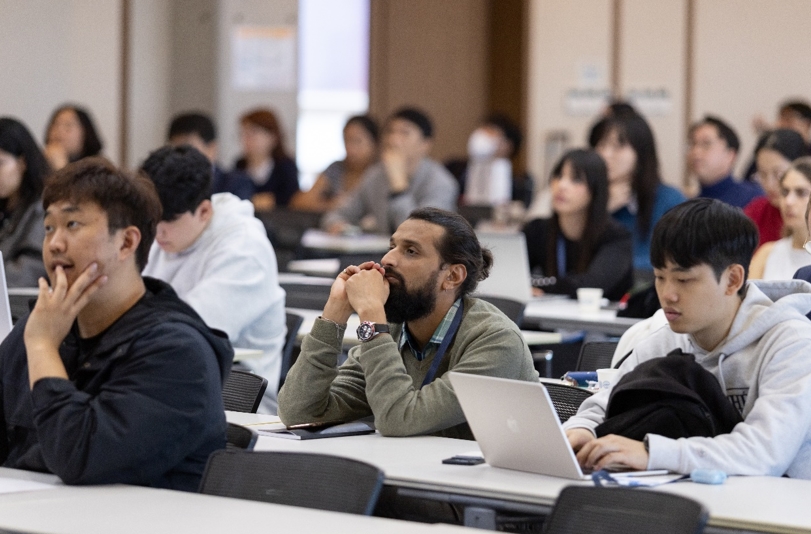
Horizon Europe Information Session Attendees
Overview of Horizon Europe and South Korea’s Upcoming Association
The information session kicked off with an overview of Horizon Europe by Dr. Tomasz Wierzbowski, Korea Representative for the EURAXESS Initiative. EURAXESS is an EU-commissioned program that promotes Horizon Europe and communicates information regarding other European research funding opportunities. Successor to Horizon 2020, Horizon Europe is the 9th EU Framework Programs, a series of funding programs that were first launched in the mid-80s to fuel scientific research in the EU. Horizon Europe is currently the biggest funding structure for research cooperation both in Europe and worldwide. The program is projected to provide almost 100 million euros for research funding between 2021 and 2027 and is divided into three pillars: Pillar 1, which supports individual researchers; Pillar 2, the biggest pillar, focuses on collaboration between institutions; and Pillar 3, which is for specialized European institutions. Pillar 2 is further divided into six clusters, each of which deals with a different area of research.
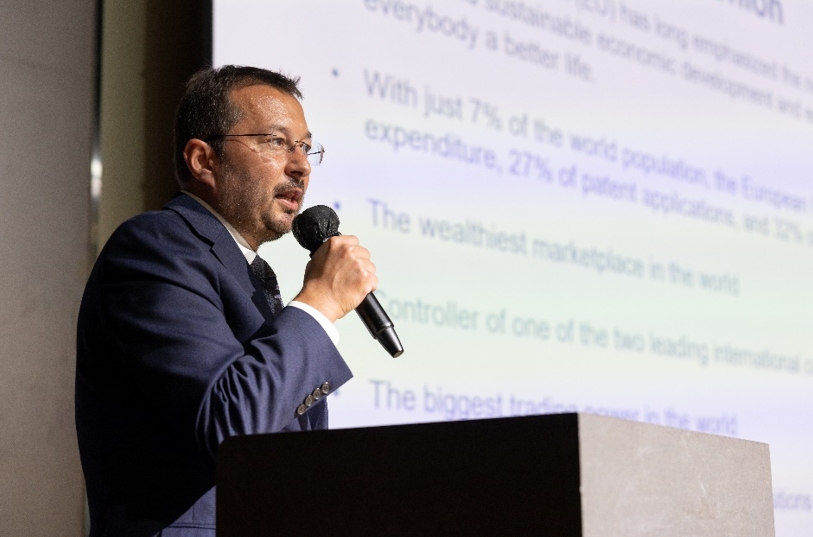
Dr. Wierzbowski delivering his talk during the session
As framework programs such as Horizon Europe continue to grow, international collaboration within such programs is increasingly encouraged as collaborators from around the world bring fresh viewpoints that help advance research. Starting in January 2025, South Korea will become an associated country in Pillar 2. Although South Korea has previously participated in Horizon Europe-funded research projects without being a member state, its new status will allow access to the same rights and terms as EU member states without being an EU country. South Korea is the second country to become an associated country outside of Europe, with New Zealand being the first.
National Contact Point Systems Within South Korea: Past, Present, and Future
Professor Tae Hyun Yoon from Hanyang University, then took the stage to explain the National Contact Point (NCP) system in South Korea. As the NCP for Horizon Europe in South Korea, Yoon described his role as providing information and support to major applicants and beneficiaries, as well as connecting local researchers and institutions with Horizon Europe. In general, NCPs organize information and promotional activities, assist with partner searching, organize training and international collaborations, and raise legal and financial issues.
South Korea has had NCP systems in place for more than 10 years. However, as a non-member state, these systems have not been very active. Now, as the nation anticipates its induction as an associated country, NCP systems are expected to become increasingly necessary and significant. In 2025, there will be an extension of NCP scope and authority, allowing Korean NCPs to access a wider jurisdiction and greater authority in decisions within the country regarding framework programs such as Horizon Europe. Additionally, the number of NCPs will increase. This strengthened Korean NCP system is expected to increase Korean participation in programs like Horizon Europe and provide better support for researchers.
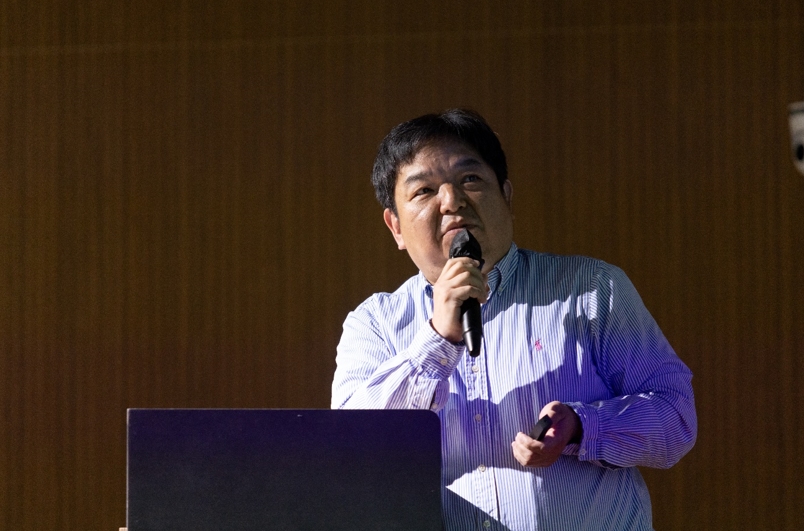
Yoon presenting on the topic of NCPs in Korea
Horizon Europe, NCPs, and Sweden-Korea Collaboration from a Swedish Viewpoint
Jenny Wanselius, Head of the EU Department and NCP coordinator at Vinnova, the Swedish agency for innovation, provided a Swedish perspective on National Contact Points (NCPs) and Horizon Europe. She emphasized the potential for increased collaboration between South Korea and Sweden after South Korea becomes an associated country. As the representative of Vinnova, Wanselius is tasked with promoting stable research growth in Sweden by funding needs-based research and innovation, as well as supporting the development of effective innovation ecosystems.
Sweden already has 20 collaborators from South Korea through Horizon Europe. Wanselius highlighted the importance of existing networks, such as SKERIC, to successfully apply for research funding under Horizon Europe. She highlighted that building strong networks is crucial, as collaborators are required to must work together to advance research projects within the framework program. As SKERIC includes five of Sweden’s top-performing universities in participation and grants under Horizon Europe, it will surely prove to be an important connection. In partnering with South Korea for Horizon Europe, Sweden’s primary focus will be placed on providing translations of important information and documents to facilitate smoother collaboration.
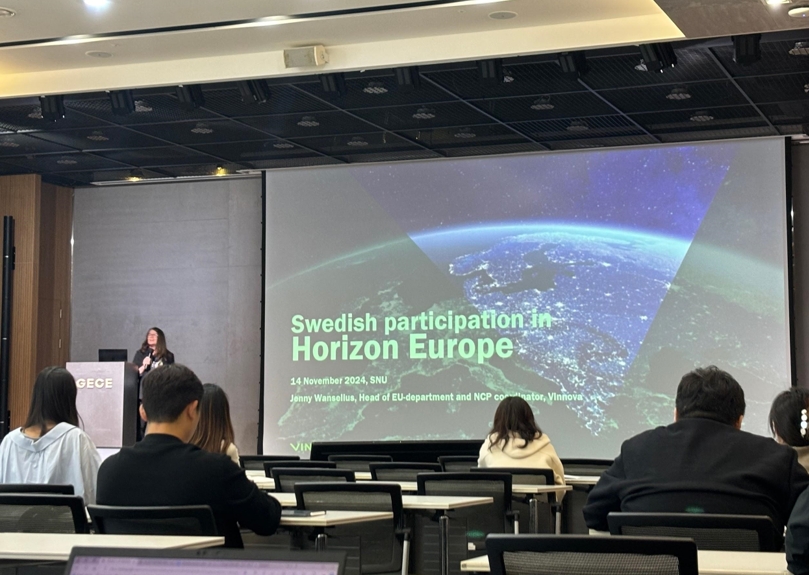
Wanselius during her presentation on Swedish participation in Horizon Europe
The information session concluded with a talk from Anna Raask, Senior Research Advisor at the KTH Royal Institute of Technology, and Dan Andrée, Representative of the University Alliance Stockholm Trio. The two explained the application process for researchers who want to apply for Horizon Europe funding in great detail. Andrée emphasized the importance of the three evaluation criteria — excellence, impact, and quality and efficiency of the implementation. The session proved to be a fruitful and enlightening explanation of Horizon Europe that inspired many researchers consider participating. We encourage aspiring researchers with an interest in international research and funding to find out more about the program and apply.
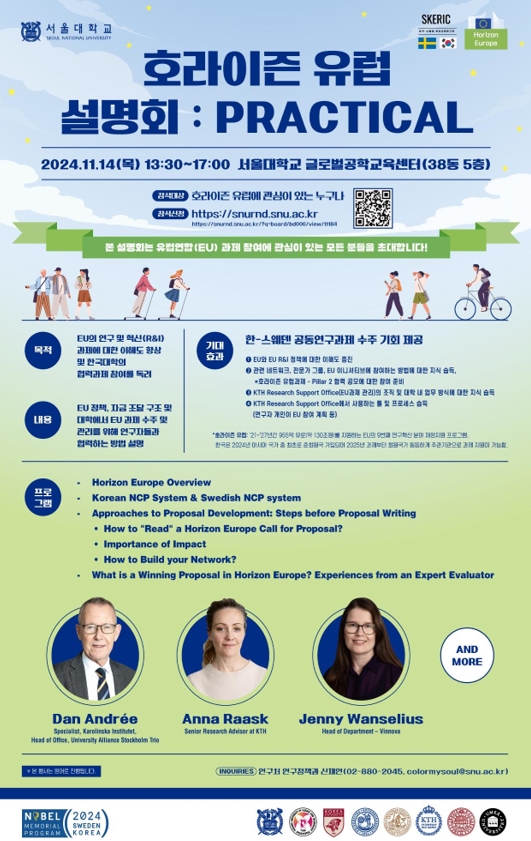
Poster for “Horizon Europe Information: Practical”
Written by Eusun Lee, SNU English Editor, sunnylee006@snu.ac.kr

